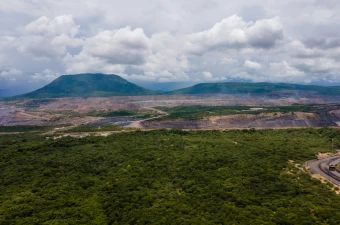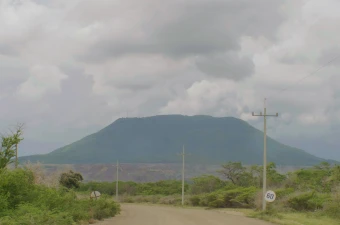Listen to the voice of mine workers
CNV Internationaal presents the Fair Work Monitor to make visible the the labour rights violations mining workers are facing in the coal sector in Colombia and in the metallurgical sector in Bolivia and Peru. The results of this Fair Work Monitor show the vulnerability of workers in the mining sector and also demonstrate the urgency of guaranteeing workers' rights especially in a context of increasing demand for minerals, due to the energy transition. The results include forced labour, lack of freedom of association and discrimination against outsourced workers, among others.
CNV Internationaal and local trade unions started working with the Fair Work Monitor in the textile and sugar industry. Now, for the first time, the Fair Work Monitor investigated the mineral supply chain.
The way the Fair Work Monitor uses digital tools to conduct surveys directly with workers is unprecedented and has created new ways of engaging with workers.
Next you can explore some of the most relevant findings.
The impact of the energy transition on labour rights
Today’s global mining industry finds itself in the middle of a drastic energy transition. Climate change pushes for important steps towards a more environmentally conscious and sustainable economy. Large fossil fuel buyers, such as European countries and multinationals in the energy mining sector, have committed themselves to lowering their carbon emissions, which should lead to important changes in the demand for strategic minerals extracted from Latin American countries.
This transition has a crucial impact on the countries that supply coal and metals. On the one hand, the increased use of electricity requires more (some 4-6 times more) metals such as copper, zinc and silver, for electric cars, wind turbines and solar panels. On the other hand, demand for coal and other fossil fuels will fall which will subsequently have an adverse effect on countries that have depended on revenues from coal extraction for decades.
Notwithstanding, the demand for these fuels is currently high because of the ongoing critical energy security situation in Europe. As a result of, high economic gains are being generated that should include energy transition investments to mitigate the impact of so many years of extractivism.
In the case of Colombia, the returning of mining titles by Glencore-Prodeco is leaving the communities and workers in a labour and social debt, who, for more than 30 years, have dedicated their time, knowledge and land to coal mining.
Meanwhile, in Peru and Bolivia, where mining extraction is concentrated on metals the raw material for clean energy), the impact has to do with the precarious working conditions as well as the workers' labour force. Outsourced workers’ tell their freedom of association is constantly violated as is their right to equal pay, and health and safety conditions in the mines.
In the context of this transition, it is important to hear the miners in order to ensure a just global energy transition. Listening to what they have to say means having workers and trade union organisations present at all times when having conversations with governments, companies and other actors in the mining and energy sector.
Main findings
The participatory digital monitoring for the mineral supply chain collected the opinions of Latin American mining sector workers for the first time through an online survey administered between March and July 2022. Out of a total of 367 workers, 35 were from Bolivia, 129 from Colombia and 203 from Peru.
The results of this Fair Work Observatory show the vulnerability of workers in the mining sector and also demonstrate the urgency of guaranteeing workers' rights especially in a context of increasing demand for minerals, such as the energy transition.

Social Dialogue
The majority of the surveyed workers were affiliated with a trade union, revealing some positive trends, such as the predominant presence of CBAs and the existence and utilisation of grivance and consultation mechanisms. These results are overshadowed by negative trends, such as an employer-worker relationship that, from the perspective of the surveyed workers, is deteriorating. despite labour union efforts opening up dialogues,
There were also many reports of strikes (most of which were in Colombia and Peru) and more than two-thirds of workers reported not feeling free to report problems.
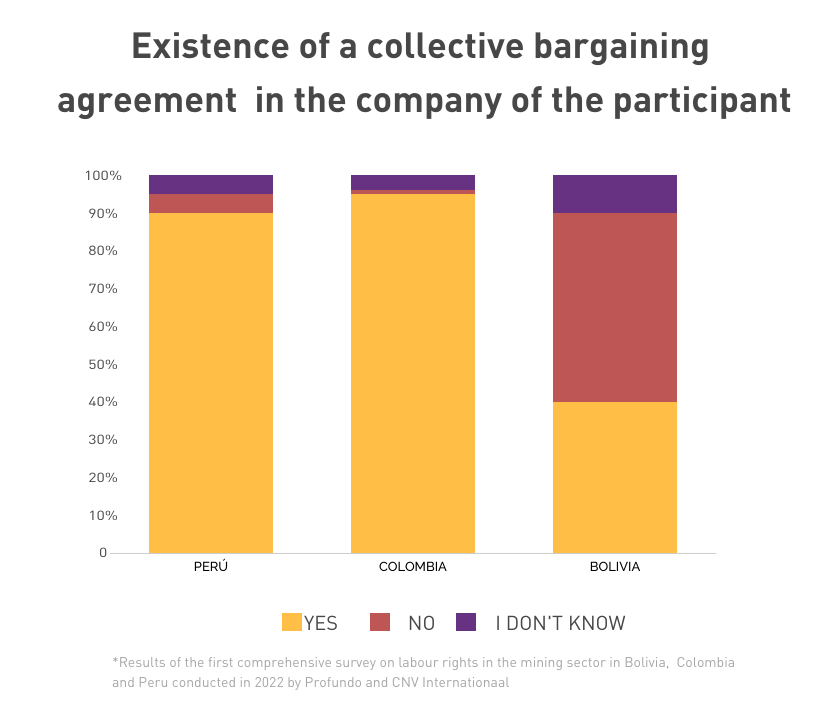
Minimum and Living Wages
14% of the workers stated that they received a salary lower than the living wage benchmark in their respective countries. 4% of the surveyed workers received a salary below the national minimum wage. The workers who reported receiving a salary below the minimum wage were Peruvian and Bolivian.
In this context, 20% of the surveyed workers in Peru and 6% of the workers in Colombia indicated receiving a salary below the national living wage. The fact that the majority of the workers indicated that their salary was above the living wage benchmark is not necessarily an indicator of financial solvency. More than half of the surveyed workers reported that their financial situation had worsened in the three months prior to the survey.
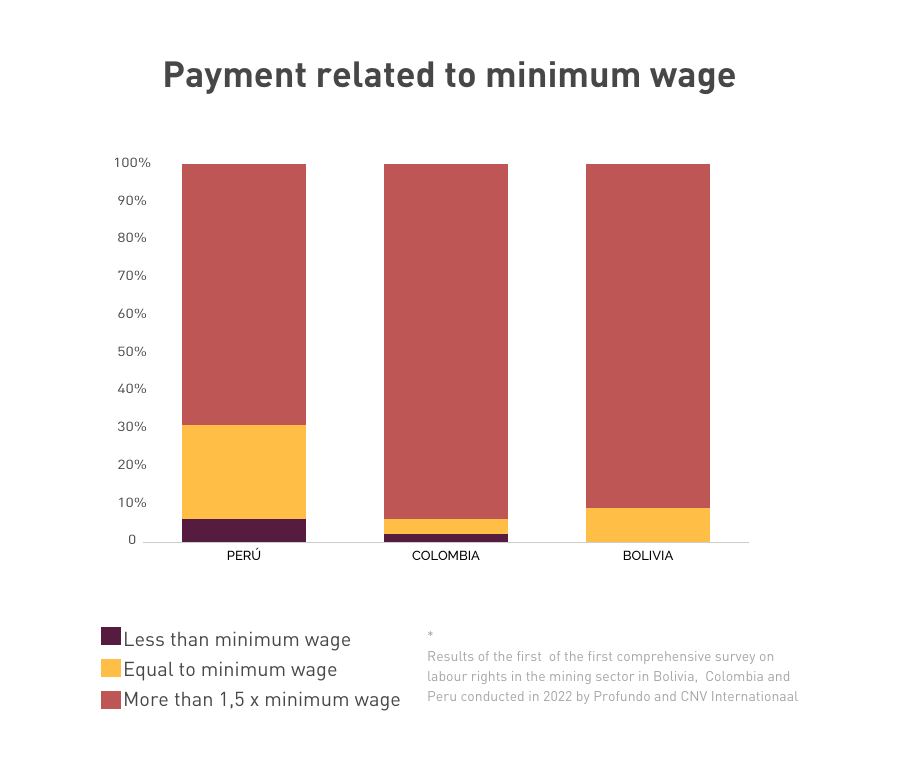
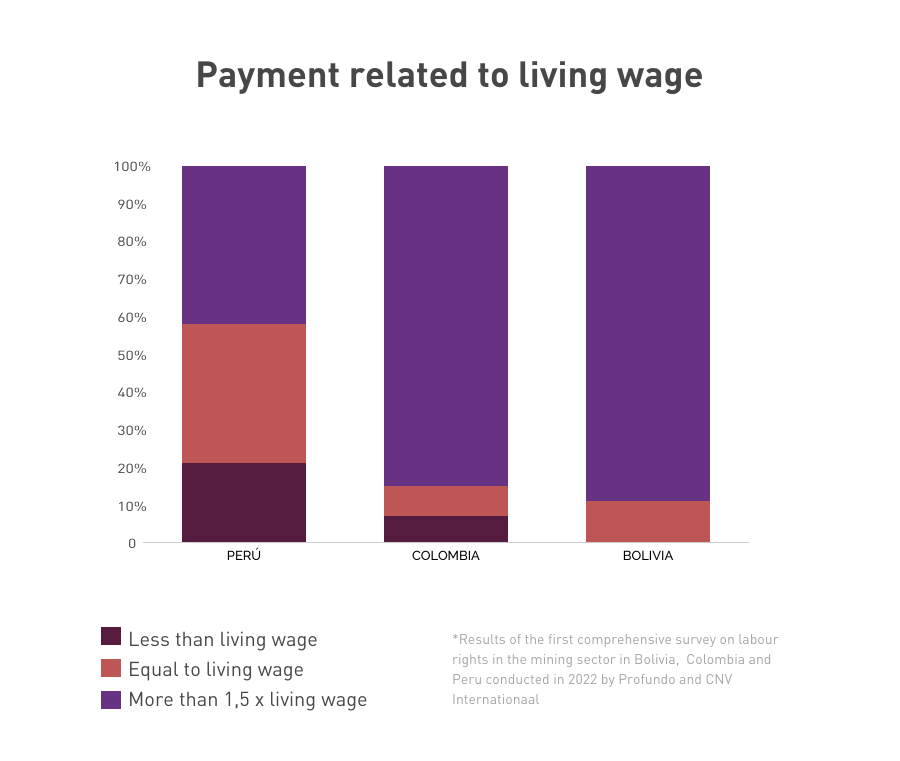
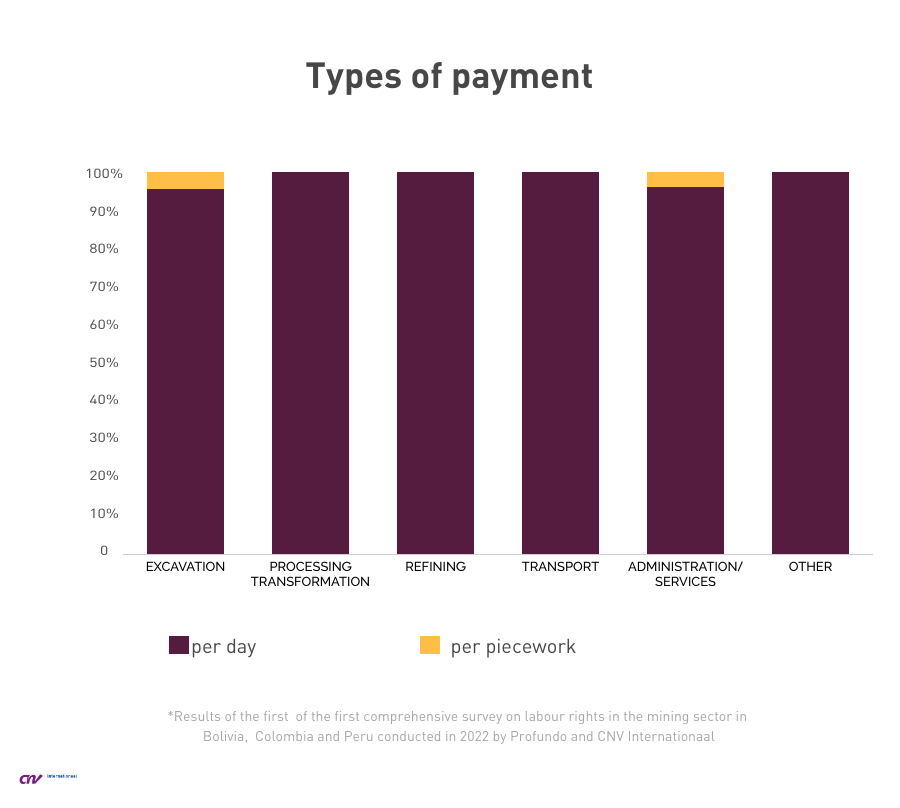
Trade Union Freedom
The results regarding freedom of association and trade union freedom depict a mixed picture. On one hand, the vast majority of surveyed companies have a union presence. Most surveyed workers consider it important to have unions in their workplaces.
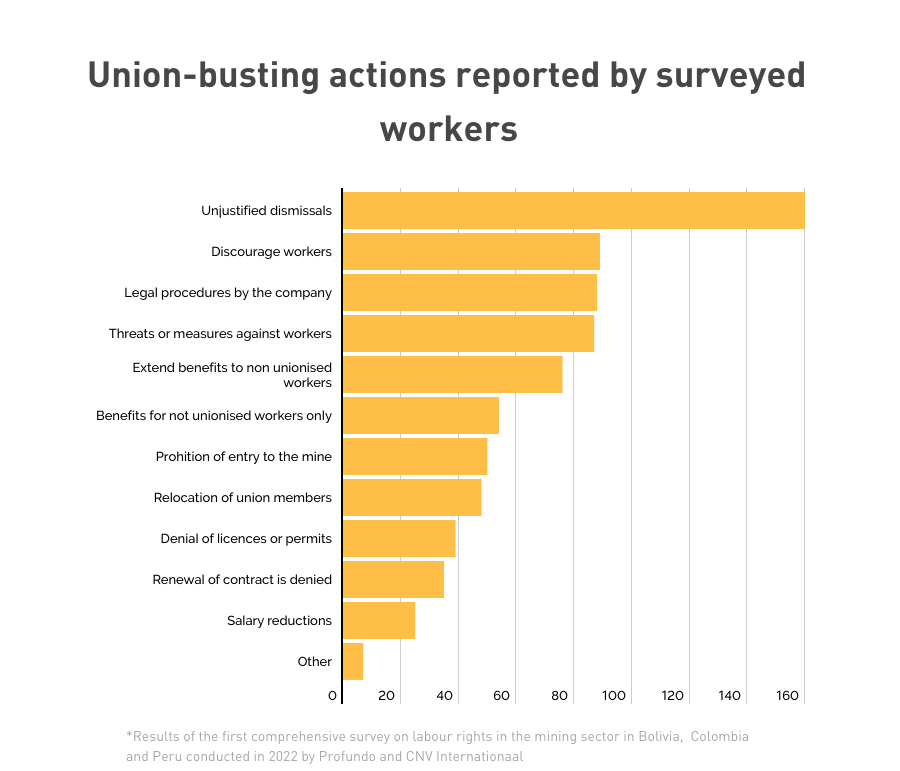
By contrast, there were instances of union-busting actions within these companies, particularly involving unjustified dismissals and efforts to discourage union membership. These actions were reported by nearly four-thirds of the surveyed workers, with Colombia and Peru having the highest incidences of union busting.
Although 90% of the workers mentioned the existence of a collective bargaining agreement (CBA) in their company, two-thirds stated that the company did not comply with what was stipulated in the agreement.
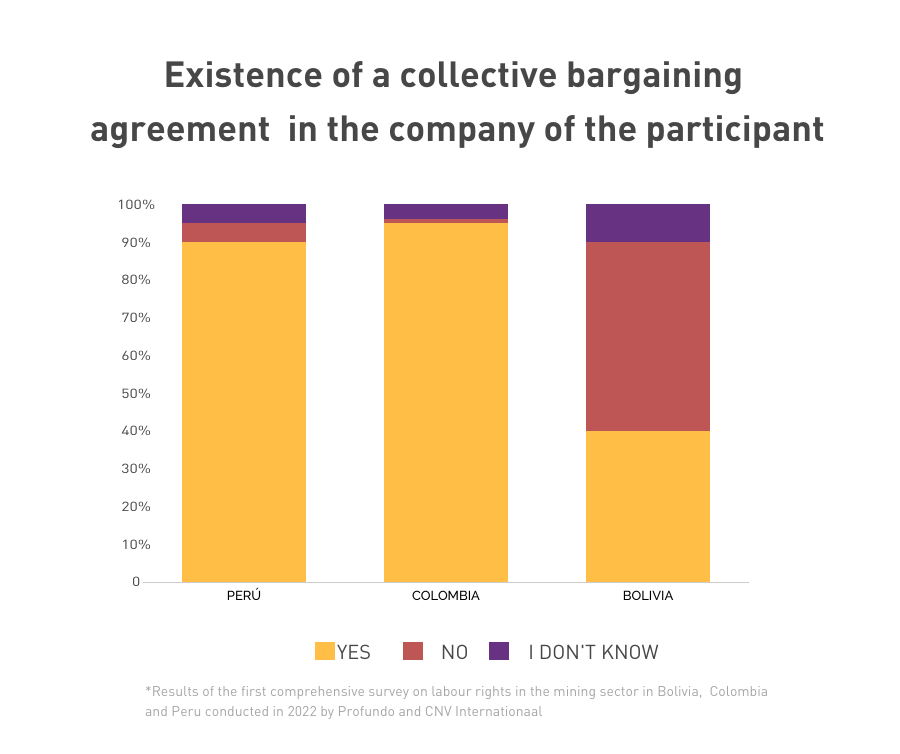
Forced labour
Workers who feel pressured to work overtime in order to earn the minimum wage may be experiencing forced labour, according to the ILO, even if their employers do not explicitly threaten them with dismissal for refusing to work overtime. This is due to the persistent fear of losing their jobs that workers may feel. In this context, 60% of the surveyed workers indicated that they work overtime. Of these, 31% said they do so because their employer forces them to, and 32% said they do it because they need the money to meet their budget.
Regarding overtime pay, 48% of the surveyed workers said the company paid overtime sometimes, 33% said the company never paid, and 19% said the company always paid overtime. Broken down by country, 49% of Bolivian workers said their company never paid overtime, and 39% of Colombian workers said their company always paid overtime
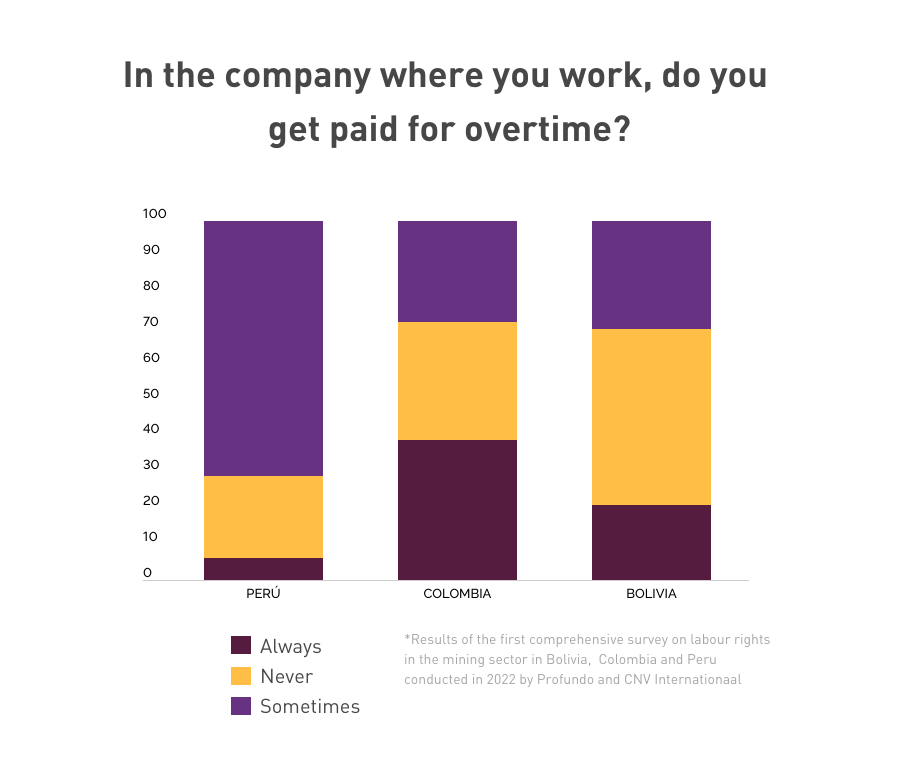
Child labour
Concerning child labour, the presence of minors and children under 14 years old was reported in the mines of Bolivia and Peru. Although the surveyed workers indicated that these minors were in the mines accompanying their parents.
According to 25% of the surveyed workers who indicated the presence of child labour in the mines, the workers who were minors in the mines were under 14 years of age (the rest indicated that the minors were 14 or older). The workers who reported the presence of minors under 14 years old were from Bolivia.
However, the presence of non-employed minors in the mine is an indicator of child labour risk and also a serious concern, as it raises issues related to the education, safety, and health of minors
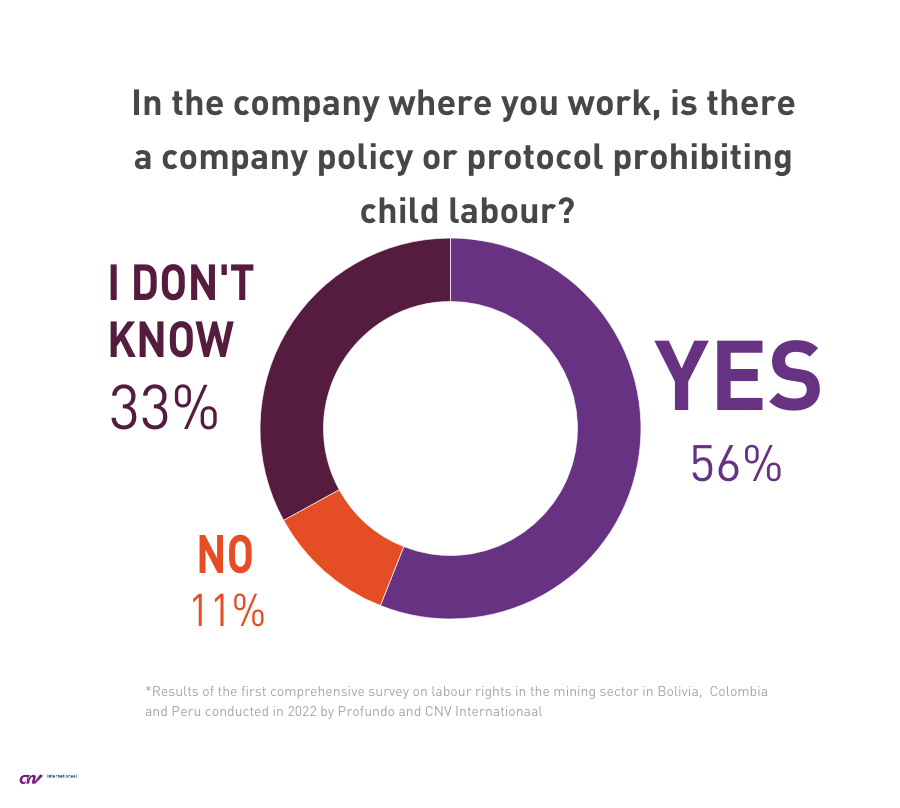
Employment security
The employment contract was the most common type of contract among the surveyed workers, although there were differences by gender and country. In comparison to women, men more frequently had an employment contract, The percentage of workers with employment contracts varied slightly among the three surveyed countries, being higher in Bolivia and lower in Peru. In Peru, more than 66% of the surveyed workers did not receive a copy of their employment contract. Of all surveyed workers 50% faced this issue.
Compared to women, men more often have a labour contract, and the percentage of workers with labour contracts varies slightly between the three countries surveyed, being highest in Bolivia and lowest in Peru 37% of the 203 participants are outsourced workers, with contracts with subcontractors and no direct link to the main company. Even in the large mining sector there is informality, workers hired through a contract that is not a labour contract, to do subordinate and paid work.
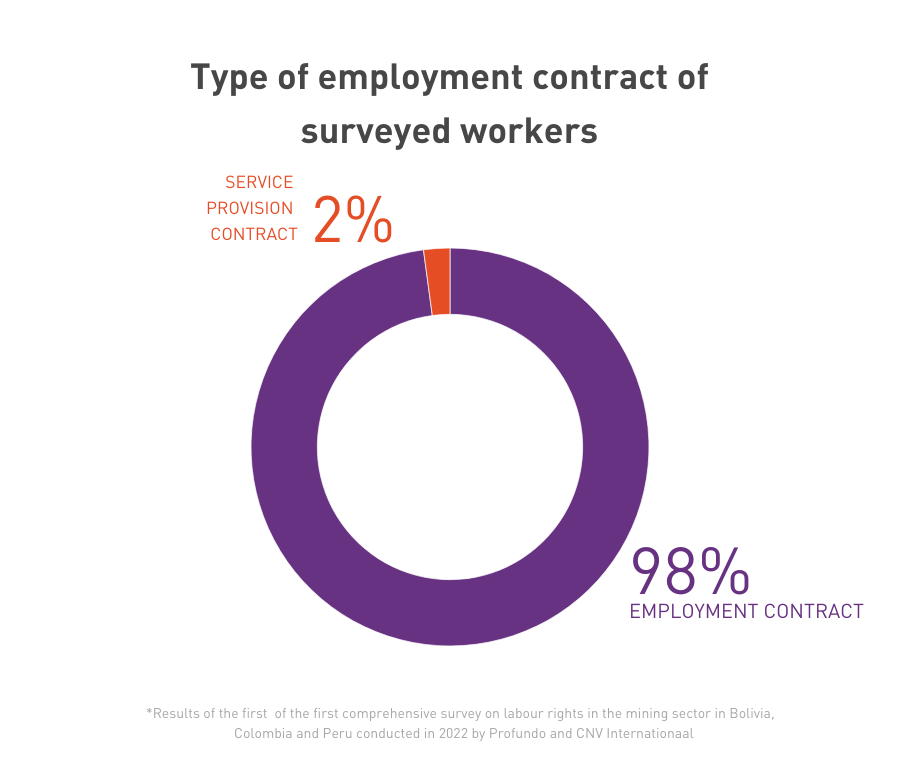
Gender
The data collected by this study suggests a low participation of women in the mining sector in Bolivia, Colombia and Peru and in their trade unions. Likewise, the results suggest a situation of gender inequality with almost a third of the surveyed women workers and a LGBTI+ person reporting having been victims of discrimination and harassment at work on the basis of gender. It was found that, among female workers surveyed, employment contracts were less common than among their male counterparts. Similarly, women and LGBTI+ people were found to work more overtime than men.


How the Fair Work Monitor works
Through a participatory survey conducted with digital tools, the CNV Internationaal’s Fair Work Monitor directly communicates with mineworkers. This provides us with data and vital information about labour conditions in the value chains of coal and metals.
Participatory
The survey was developed by CNV Internationaal's Latin America team. To identify issues of interest to trade unions in Bolivia, Colombia, and Peru, consultations were conducted with union leaders in these countries. Through these questions we gathered data for Key Performance Indicators (KPIs) that will be used to monitor progress and setbacks in labour rights over the years, from the perspective of sector workers.
First hand information
This first Fair Work Monitor in mining contains first-hand information reported directly by the workers. It serves as a baseline for CNV Internationaal, allowing for the observation of future trends and the state of indicators. Additionally, the report aims to provide reliable information that will empower workers and union leaders in the respective countries to engage in informed discussions during negotiation processes in the context of the energy transition.
Transparency
The Fair Work Monitor aims to enhance transparency within the sector by assessing companies' compliance across various segments of the supply chain concerning their obligation to protect workers' rights. In this context, the information presented serves as an initial reference point that will be continually updated to monitor and analyse states and trends, whether positive or negative, throughout the years of sector monitoring
The approach through which the survey was conducted with the participants was centered on the ILO core conventions on decent work of the International Labour Organisation ILO.
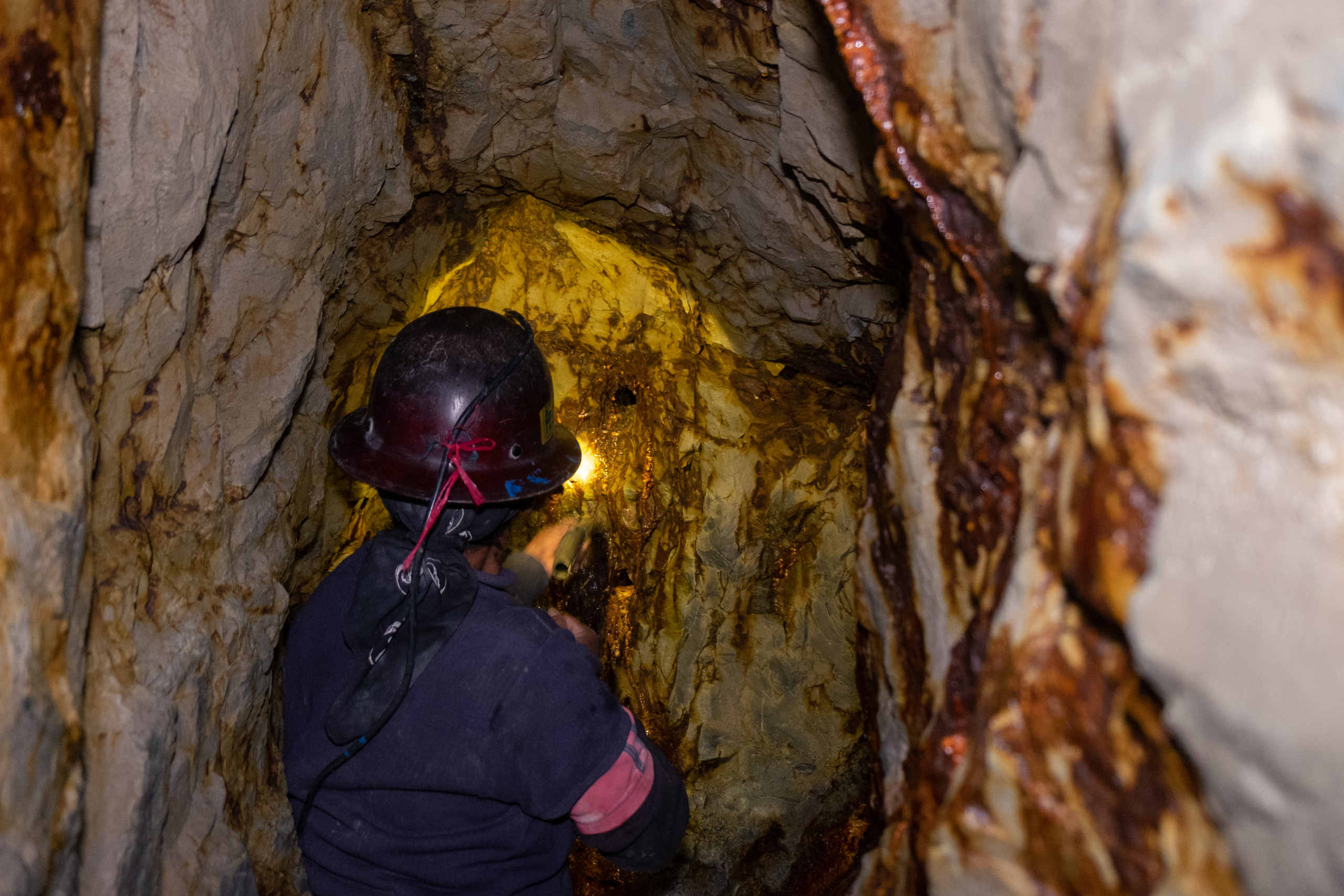
About the participants
From May to July 2022, 367 workers of the mining sector participated.
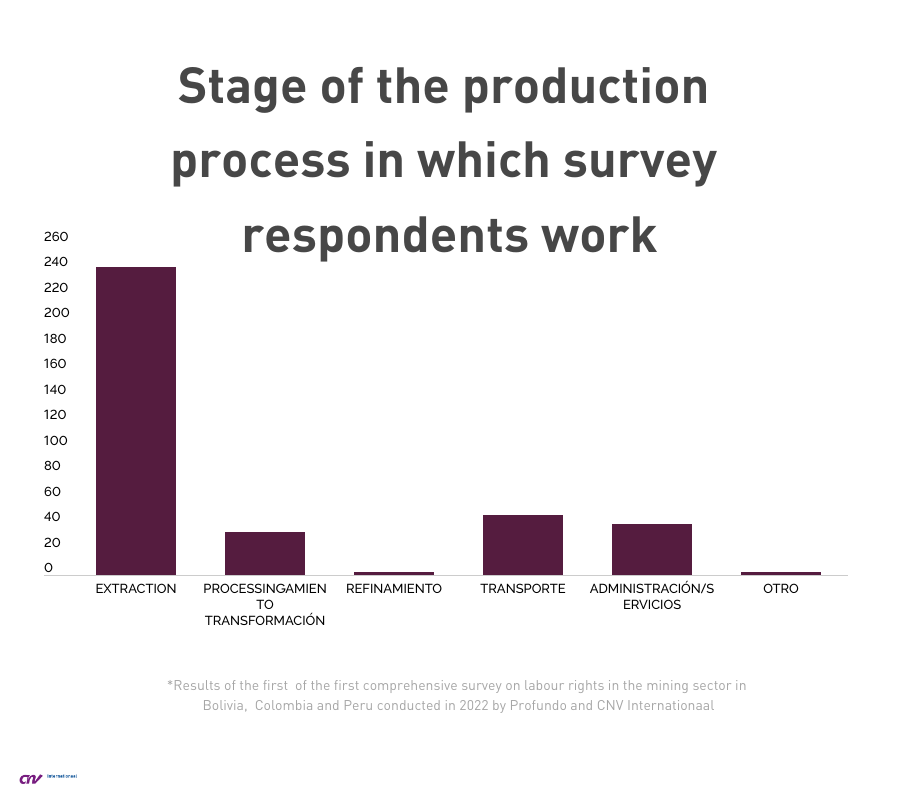
Through digital platforms such as social networks, email and WhatsApp; as well as thanks to the face-to-face work of the unions and their leaders who act as Digital Monitoring liaisons in each country, which allowed the voice-to-voice exercise among workers, we managed to reach 367 mine workers, of which 35 were employed in Bolivia, 129 in Colombia and 203 in Peru. It is vital to note that 240 of the total number of participating workers are in the excavation area of the mines where workers' rights appear to be most violated.
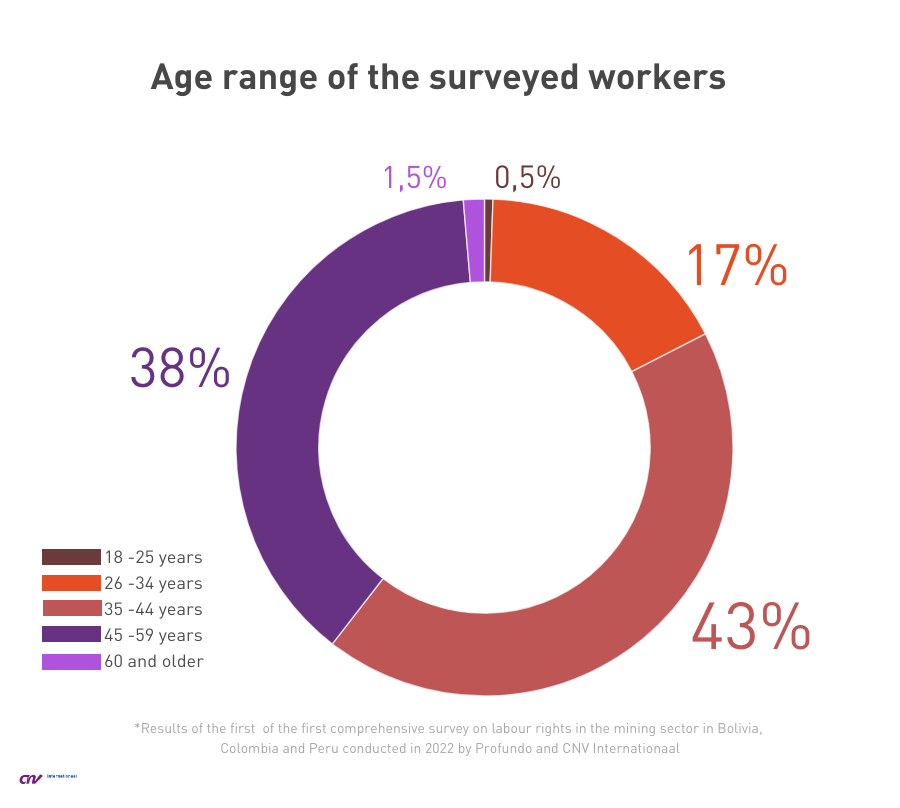
Fair Work Monitor Report

Learn more
The first annual report for the Latin American mining sector is part of a series of investigations into the sector that CNV Internationaal has been conducting in collaboration with Profundo over the past year. This includes report on labour risks in the sector and a study on health and safety risks in mining in Bolivia, Colombia, and Peru.
Learn more: Just transition in mining (cnvinternationaal.nl)
Publication date 16 10 2023
